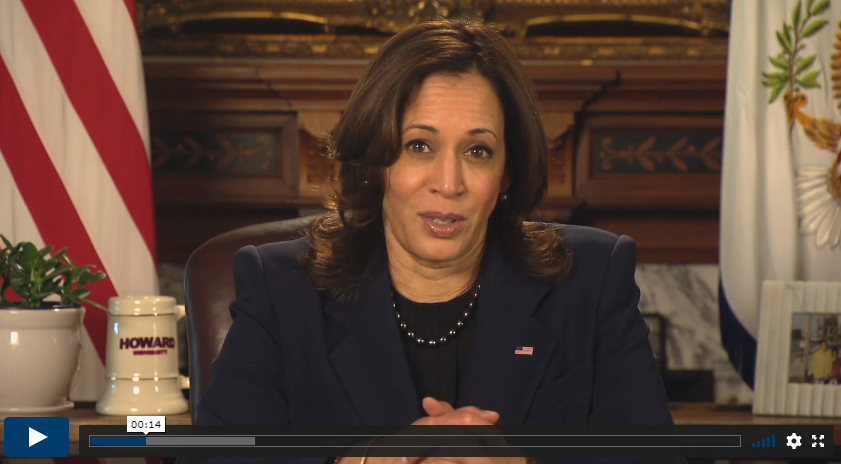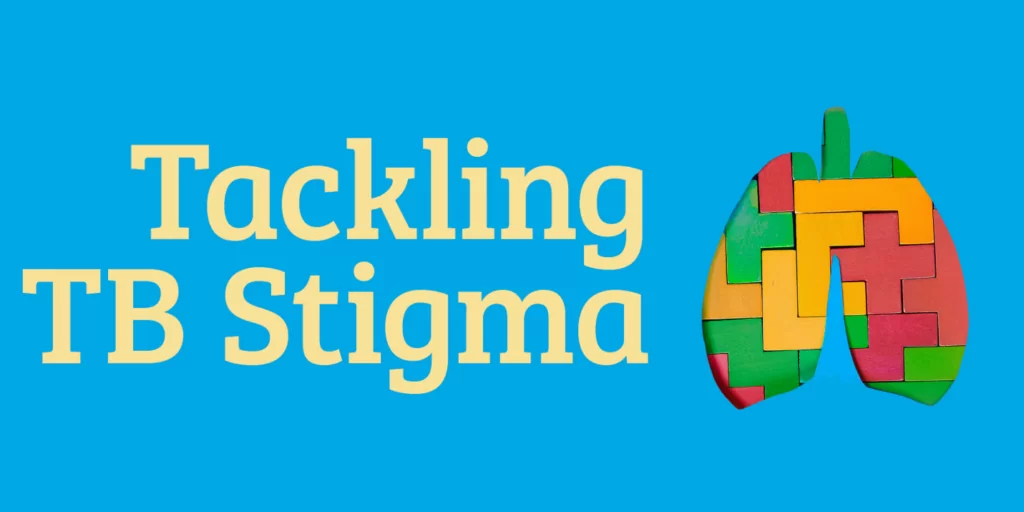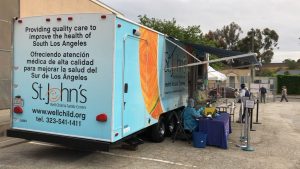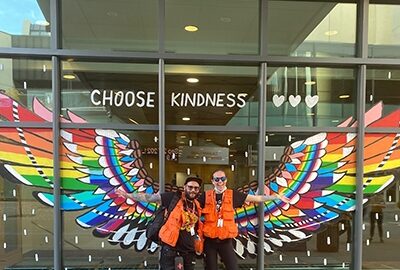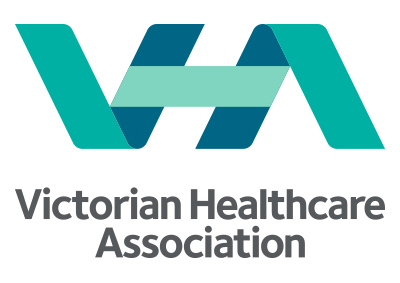IFCHC e-Newsletter 2021.01
News and stories from IFCHC member Community Health Centres and CHC associations around the world
Community Health Center, Inc. leads COVID-19 testing and vaccination efforts in Connecticut, USA
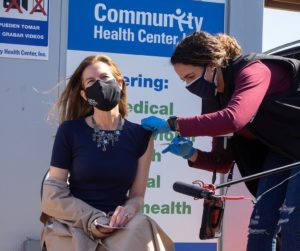 Within days of the pandemic being declared in March 2020, Community Health Center, Inc. (CHCI) mobilized to ensure its patients, many of whom are socially vulnerable with complex medical and behavioral health conditions, had access to care via telehealth.
Within days of the pandemic being declared in March 2020, Community Health Center, Inc. (CHCI) mobilized to ensure its patients, many of whom are socially vulnerable with complex medical and behavioral health conditions, had access to care via telehealth.
Headquartered in Middletown, Connecticut, CHCI began working almost immediately with the State of Connecticut to stand up COVID-19 testing facilities across the state. At the peak of the pandemic, more than 5,000 people were being tested daily at CHCI’s 18 drive-through testing locations.
As of April 2021, nearly 600,000 tests had been performed, including at daily mobile clinics able to bring testing directly those without access to the drive-through sites. Based on CHCI’s success with testing, the organization was tapped by Connecticut Governor, Ned Lamont, to organize drive-through mass vaccination clinics.
Thus began an unlikely partnership between a global aerospace manufacturer and CHCI — Connecticut’s largest health care provider for vulnerable residents — bringing an historic runway back to life in service of the nation’s health. The Pratt & Whitney Runway once saw the likes of Amelia Earhart and Charles Lindbergh, and sits across from the plant where some of the world’s most sophisticated jet engines are designed and manufactured. CHCI approached Pratt & Whitney about using its decommissioned runway in East Hartford, CT as a mass vaccination clinic.
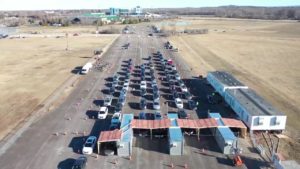 The company made the runway available free of charge, and within one week, CHCI transformed the dormant two-mile strip of concrete, without electricity or running water, into the state’s largest mass vaccination site – a “vaccine village” capable of administering 5,000 COVID shots daily.
The company made the runway available free of charge, and within one week, CHCI transformed the dormant two-mile strip of concrete, without electricity or running water, into the state’s largest mass vaccination site – a “vaccine village” capable of administering 5,000 COVID shots daily.
CHCI staff and the National Guard administer vaccines 8:30am – 4:00pm daily at this location, as well as other mass vaccination sites built and run by CHCI in the cities of Danbury, Middletown and Stamford, Connecticut. In addition, mobile vaccination units bring vaccines into the community, including farms, senior and congregate housing, shelters, and churches. Now that vaccinations in Connecticut are open to anyone over age 16, CHCI is sponsoring special events for high school students, helping them access the vaccine so they can end their school year with traditional events like prom and graduation.
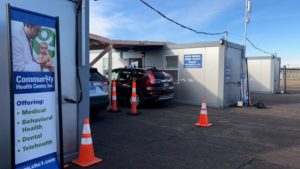
To date, CHCI has administered more than 250,000 vaccines throughout the State of Connecticut.
One of IFCHC’s earliest member Community Health Centers, CHCI has received significant local and national media attention for its leadership throughout the pandemic. CHCI’s vaccination clinic at Pratt & Whitney Runway was featured recently in a front-page story shared nationally and globally via the Sunday New York Times.
On March 16, U.S. Vice President Kamala Harris delivered an address to the 2021 Policy and Issues Forum of the US National Association of Community Health Centers (NACHC) praising the country’s Community Health Centers for their leadership on prevention, care and vaccination throughout the COVID-19 pandemic. Click image below to view video (external link).
On January 20, 2021 the BBC aired a primetime programme, The Truth About… Improving Your Mental Health. Programme presenter, Professor Tanya Byron, visited IFCHC’s member CHC, Bromley by Bow Centre, in east London, to find out more about the CHC’s social prescribing efforts, how they work and the impact they’ve had in addressing loneliness, social isolation, and mental illness among clients the organization serves.
Connecting the dots and addressing whole person needs in Melbourne, Australia during the pandemic
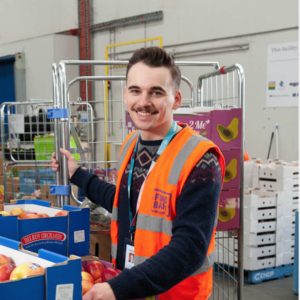 Victoria State is home to Australia’s largest network of Community Health Centres and, no surprise, has seen the country’s most robust community-based responses to the COVID-19 pandemic.
Victoria State is home to Australia’s largest network of Community Health Centres and, no surprise, has seen the country’s most robust community-based responses to the COVID-19 pandemic.
The multi-faceted work of cohealth, in Melbourne, underscores the diverse ways in which CHCs throughout the state have mobilized to care for and support community members throughout the pandemic. Key to this is not only caring for clients through primary care, dental care and other health services, but addressing the wide range of social determinants of health.
Several media reports and articles focused on cohealth‘s efforts over the past months paint the picture. An innovative health concierge program, managed by cohealth, to combat COVID-19 misinformation in some of the city’s most densely populated highrise towers. A community partnership program with hard-hit multicultural businesses to simultaneously address a number of social and health problems caused by the pandemic, including unemployment, food security, and declining business. And, an essentials support program led by cohealth’s Homelessness and Health Support team providing outreach services to residents at caravan parks and rooming houses.
Mountain Family Health Centers’ efforts to support uninsured clients in Colorado State
In this recent blog post from Mountain Family Health Centers, in Glenwood Springs, Colorado (USA), Chief Executive Officer Ross Brooks provides an update on the continued challenges of residents without health insurance coverage and efforts by their CHC to lead through accessible services and advocacy for health coverage.
Navigating the early pandemic: A look back from Seaway Valley Community Health Centre
There many lessons to be learned from the COVID-19 pandemic that can help improve community response to emerging issues in future. A multi-part report (March to Sept 2020) shared by IFCHC member Seaway Valley Community Health Centre in Cornwall, Ontario, Canada, provides a lot of insight into how their CHC adapted and ideas for other CHCs to consider.
“Beat the Burn” aims to support frontline workers coping with COVID-19 burnout
One of IFCHC’s members in Calgary, Alberta, Canada — The Alex Community Health Centre — is actively participating in local efforts to not only tackle the pandemic on the frontlines, but to care for the carers. Learn more about the “Beat the Burn” initiative that aims to bring care provider burnout into the open and to ensure much needed supports.
The fight for vaccine equity in Los Angeles, California, USA: A look at efforts by St. John’s Well Child and Family Center and community partners
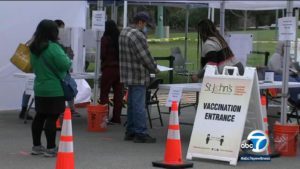 Since the start of the COVID-19 pandemic, South Los Angeles (California, USA) has suffered more than any other part of Los Angeles County or the state of California. The health disparities and inequities were exacerbated by the conditions of people’s lives. Most South LA residents work in frontline and essential industries and were unable to shelter at home. South LA had the highest rates of COVID-19 infection, hospitalization and death in the state.
Since the start of the COVID-19 pandemic, South Los Angeles (California, USA) has suffered more than any other part of Los Angeles County or the state of California. The health disparities and inequities were exacerbated by the conditions of people’s lives. Most South LA residents work in frontline and essential industries and were unable to shelter at home. South LA had the highest rates of COVID-19 infection, hospitalization and death in the state.
In response, St. John’s Well Child and Family Center, the largest healthcare provider in South LA, mobilized to provide testing, monoclonal antibody infusion treatment and vaccinations to this hard hit community.
Since January, St. John’s has vaccinated over 150,000 South LA residents against COVID-19. The overwhelming majority of those vaccinated are African American, Latino and low-income families. With 30 clinic and community vaccination sites and three mobile vaccine clinics as of April 2021, St. John’s Well Child and Family Center is the largest COVID-19 vaccine provider in South LA – which is the largest area of contiguous poverty in the United States. The Community Health Center is currently vaccinating over 30,000 a week, and by the end of April that will increase to over 50,000 vaccines administered each week.
The road to vaccination for South LA was not an easy one however. When the state started receiving vaccines in early January – most of the vaccines were sent to the wealthier communities on the west side of Los Angeles. South Los Angeles did not receive any doses in the original vaccine delivery.
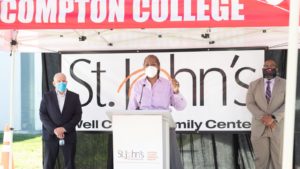 In response to this egregious disparity, St. John’s mobilized the South LA community. Hundreds of churches, community based organizations, labor unions and fellow Community Health Centers signed on to a letter demanding access to the COVID-19 vaccine for the people of South Los Angeles. Within a week, COVID-19 vaccines were allocated to St. John’s and other South LA providers, and the mass vaccine effort got underway.
In response to this egregious disparity, St. John’s mobilized the South LA community. Hundreds of churches, community based organizations, labor unions and fellow Community Health Centers signed on to a letter demanding access to the COVID-19 vaccine for the people of South Los Angeles. Within a week, COVID-19 vaccines were allocated to St. John’s and other South LA providers, and the mass vaccine effort got underway.
St. John’s led the community vaccine effort, partnering with African American churches, labor unions, elected officials, school districts and community based organizations to offer COVID-19 vaccines at sites strategically located throughout South LA.
The mobile vaccine clinics allowed St. John’s to establish “pop-up” vaccination sites at schools, churches, and homeless shelters to reach the most vulnerable residents. More than 85% of people vaccinated by St. John’s are low-income and people of color, creating greater vaccine equity on the ground and a model for equitable vaccine administration.
Reflections on COVID-19: one patient’s journey

Tichianaa Armah, MD
By: Tichianaa Armah, MD – Chief of Psychiatry, Community Health Center, Inc., Middletown, CT, USA
She imagined that she would be found in her home dead weeks after losing her life from complications of COVID-19. I was calling her for a telehealth session, to inquire about her mental health. Despite her initial optimism during the early days of the pandemic she had completely decompensated and was worse than she had ever been emotionally. She was still physically unwell, coping with shortness of breath, which was never one of her medical problems previously, and it had been over a month since her second infection with COVID-19.
Working as a housekeeper for wealthy families she was not in the position to work remotely and her financial woes seemed to match her physical and emotional state. Everything was in shatters and now she was back up to the high doses of medications that she was on when I inherited her case. She was contemplating if her loss of life would not actually be welcomed.
Months later, and now after her second dose of the COVID-19 vaccine, my patient has a renewed lease on life. She still needs to see a lung specialist, but after months of physical suffering as a consequence of COVID-19 infection she is breathing easier.
The vaccine received at Community Health Center, Inc, has restored her hope for the future. She is no longer in fear of leaving her home as she works to put food on her table. She was at risk of being in a debilitated state of trauma for years, but today she is better than ever.
Ottawa’s COVID-19 Isolation Emergency Fund: providing critical support for individuals without status
 By: Nimo Farah – Manager, Ottawa Newcomer Health Centre at Somerset West Community Health Centre, Ottawa, Ontario, Canada
By: Nimo Farah – Manager, Ottawa Newcomer Health Centre at Somerset West Community Health Centre, Ottawa, Ontario, Canada
The Ottawa Newcomer Health Centre (ONHC) at Somerset West Community Health Centre delivers culturally appropriate services that promote and increase health and social well-being for refugees, immigrants, and newcomers. Our services include bridged primary care, mental health services, system navigation support, and language interpretation services.
During the pandemic, our multicultural health navigators and clinical staff have done community outreach, have distributed masks and hand sanitizers, have provided multilingual information on COVID-19 Wise practices, and have provided wrap-around supports for clients who test positive for COVID-19.
The pandemic has impacted our lives in unimaginable ways, but for undocumented individuals, their “invisible status” has made things even more devastating. They face financial hardship and instability, many having lost their basic supports for living — typically a precarious low-wage, temporary job. They live in fear of being deported, incarcerated, detained, or facing a steep penalty. All of these factors make it extremely difficult to reach this community with support.
The pandemic has highlighted systemic barriers faced by individuals and families without status. Many in desperate need of life-sustaining support cannot qualify for COVID-19 emergency programs administered by federal and provincial governments.
In January 2021, the City of Ottawa recognized this critical issue and created a “COVID-19 Emergency Isolation Fund” for individuals without status and not eligible for provincial or federal assistance. The ONHC at Somerset West CHC was mandated to administer the program and coordinates the logistics.
To date, we have mobilized our existing networks of social services, food banks, shelters, community resource centres, and faith-based religious organizations where our clients and other persons without status have established relationships of trust. So far, 70 organizations have partnered, resulting in 24 referrals for 67 people.
Partner agencies are asked to assess clients’ eligibility for the emergency program and to complete a referral form. Once our team has received referrals, we administer support and funds to the applicants, ensuring strict confidentiality. Challenges remain though. Some families in need have still not participated in the program for fear of what will happen to them if they identify themselves.
Regional collaboration by Community Health Centres in Ottawa, Canada a case study in optimizing community reach and impact during pandemic
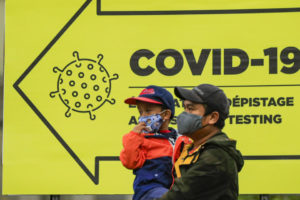 IFCHC’s current members in Canada’s capital city — Centretown CHC, Somerset West CHC, and South-East Ottawa CHC — are all partners in a city-wide COVID-19 community collaborative that brings together the city’s Community Health Centres with other community partners to achieve coordination, scale, and increased impact for residents of Ottawa.
IFCHC’s current members in Canada’s capital city — Centretown CHC, Somerset West CHC, and South-East Ottawa CHC — are all partners in a city-wide COVID-19 community collaborative that brings together the city’s Community Health Centres with other community partners to achieve coordination, scale, and increased impact for residents of Ottawa.
The collaborative is framed within the Ottawa Health Team – Équipe Santé Ottawa Community COVID-19 Response, in which six Community Health Centres in Ottawa signed a Memorandum of Understanding with the local public health unit, Ottawa Public Health (OPH), to receive direct referrals and provide additional supports to individuals and families that OPH identifies as requiring additional support to safely isolate at home.
The goal of the strategy is to mitigate the transmission and impact of COVID-19 in disproportionally affected, equity-seeking communities, particularly racialized, immigrant, and low-income individuals and families.
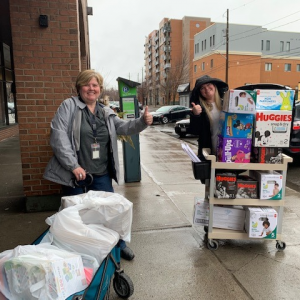
It is a multi-pronged strategy that uses a community development approach to address the social determinants of health that are implicit in the transmission and impact of COVID-19 and is designed to evolve as we learn more about community needs and priorities.
All referrals are triaged through a ‘central intake,’ managed by the South-East Ottawa Community Health Centre. Referrals are sent to one of the CHC partners via an e-referral platform to connect with the client. The client is contacted and support is provided as follows:
- Review and understand the information provided to them by OPH, in their language of choice
- Identify and review OPH guidelines for isolation
- Access additional supports needed to isolate safely (e.g., food, medications, masks, cleaning supplies, baby supplies)
- Provide referrals and connections to other social services as needed (e.g., counselling, financial aid, etc)
- Arrange for the delivery of wrap around support for the isolation period
The strategy has had a very important impact for vulnerable individuals and families in the Ottawa region throughout the pandemic. Recently, the Ottawa Citizen featured the story of a family of five who all contracted COVID-19 and were effectively cared for and supported by the Community Health Centres collaborative.
Colleagues wishing to learn more about this Ottawa strategy can access the Strategy Framework (as of Jan 2021) which provides a description, flow charts, protocol, key messages and more.
This local strategy and Community Health Centres collaborative builds on a rich tradition of collaboration among community agencies in the Ottawa area. Earlier in the pandemic this included partnership among 13 local service agencies, including several of the city’s CHCs, to develop a one-stop portal for counselling and other mental health supports.
A look back at a year of adaptation, innovation, and major impact at The Alex Community Health Centre
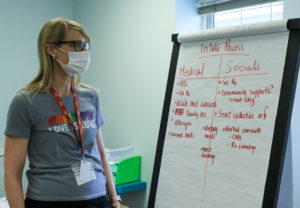 Responding to shifting guidelines, overcoming technical hurdles, building new programs, maintaining our areas of strength and ensuring our teams are safe, both physically and emotionally – this has been the drumbeat of the last twelve months at The Alex Community Health Centre.
Responding to shifting guidelines, overcoming technical hurdles, building new programs, maintaining our areas of strength and ensuring our teams are safe, both physically and emotionally – this has been the drumbeat of the last twelve months at The Alex Community Health Centre.
Here’s a look at some of what The Alex CHC, located in Calgary, Alberta, Canada has been able to achieve in the past year:
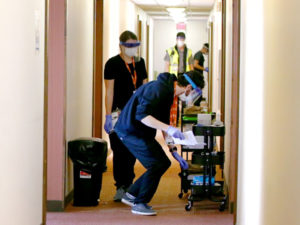 Assisted Self Isolation Site (ASIS): This new program was born from a need to provide medically-supported accommodations for those experiencing homelessness who needed to self-isolate. The program and facility operates in partnership with the province’s health authority, Alberta Health Services (AHS), as well as The Calgary Homeless Foundation (CHF) and another Calgary-based Community Health Centre, CUPS. It is a stellar example of system-wide collaboration, and the power of human kindness.
Assisted Self Isolation Site (ASIS): This new program was born from a need to provide medically-supported accommodations for those experiencing homelessness who needed to self-isolate. The program and facility operates in partnership with the province’s health authority, Alberta Health Services (AHS), as well as The Calgary Homeless Foundation (CHF) and another Calgary-based Community Health Centre, CUPS. It is a stellar example of system-wide collaboration, and the power of human kindness.
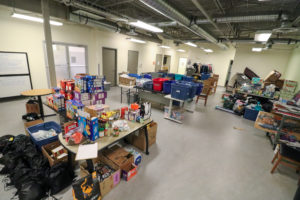 Social Dispatch: Phone banks, laptop drives and curbside visits — these were the new ways of providing social supports during the past year. The Alex CHC collaborated across the full agency, bringing their social work teams from all programs together to share resources, and come together to provide phone and online support for 4201 youth, adults and seniors who need basic needs, referrals, and human connection. Now that they have been able to safely re-open their drop-in spaces and re-engage their mobile buses, Social Dispatch staff have been redeployed back to their respective programs, but the energy of this collective spirit remains.
Social Dispatch: Phone banks, laptop drives and curbside visits — these were the new ways of providing social supports during the past year. The Alex CHC collaborated across the full agency, bringing their social work teams from all programs together to share resources, and come together to provide phone and online support for 4201 youth, adults and seniors who need basic needs, referrals, and human connection. Now that they have been able to safely re-open their drop-in spaces and re-engage their mobile buses, Social Dispatch staff have been redeployed back to their respective programs, but the energy of this collective spirit remains.
- 539 referrals to benefits / emergency benefits
- 2833 counselling and support sessions
- 2555 Check-ins with at-risk youth to make sure they are ok
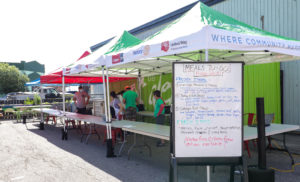 Community Food Centre (CFC): As the pandemic began, the Alex’s Community Food Centre became one of few places where members of their community could safely gather. Making use of their large parking lot and outdoor garden space, the Alex’s team prepared thousands of takeout meals and curbside meal kits, and provided affordable produce markets and resource fairs, ensuring Calgarians could safely access healthy food and stay connected. They also transformed their community program delivery models, shifting to online cooking classes (where ingredients could be picked up and brought home), and Zoom classes for Indigenous knowledge sharing programs and coffee chats with peer advocates.
Community Food Centre (CFC): As the pandemic began, the Alex’s Community Food Centre became one of few places where members of their community could safely gather. Making use of their large parking lot and outdoor garden space, the Alex’s team prepared thousands of takeout meals and curbside meal kits, and provided affordable produce markets and resource fairs, ensuring Calgarians could safely access healthy food and stay connected. They also transformed their community program delivery models, shifting to online cooking classes (where ingredients could be picked up and brought home), and Zoom classes for Indigenous knowledge sharing programs and coffee chats with peer advocates.
- 876 first time visitors to the CFC in the past year
- 1419 Curbside pickups
- 92% said the CFC was an important source of healthy food during COVID
On the frontlines at Calgary’s Assisted Self-Isolation Site
 By: Jen Eyford – Associate Director of Mental Health and Addictions, The Alex Community Health Centre, Calgary, Alberta, Canada
By: Jen Eyford – Associate Director of Mental Health and Addictions, The Alex Community Health Centre, Calgary, Alberta, Canada
The first time I set foot into the hotel that served as the Assisted Self-Isolation Site (ASIS) I thought I would spend a few weeks in the empty ballroom where we all sat on plastic chairs and folding tables.
Working at ASIS seemed dreamlike, even magical. Time didn’t exist – 11, 12 or even 13 hours felt like the blink of an eye. We called it the ASIS ‘time warp’. The workload was immense and the energy in the building was frenetic but it was also euphoric and maybe even a little addictive.
I felt a full range of emotions every day: fear, joy, belonging, connection. Things formerly important to me became a faint afterthought – who pays attention to color-coordinated clothing and make-up during a pandemic?! Things I had never thought about before became all-consuming, like how to get rid of the rash the mask is causing.
After a few incredibly busy the frantic, anxious energy had dissipated and there seemed to be a confidence to our work.
We knew we could do what had seemed impossible.
We had figured out how to provide good care to vulnerably housed individuals who are accustomed to congregate living, and spending time with their street family while dealing with mental health and addiction issues, boredom, and trauma.
I don’t know what the future of COVID has in store but I am so proud of how we all problem-solved to do things we haven’t done before. COVID has changed all of us – for the better.

